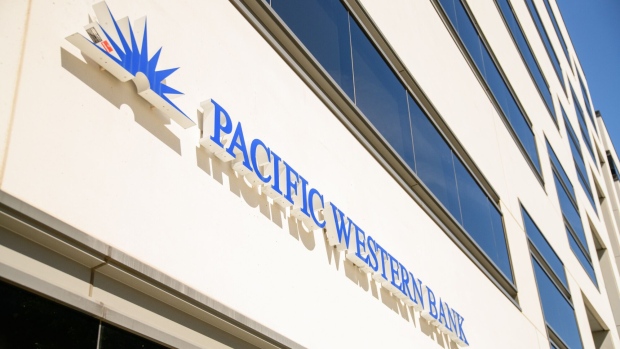May 4, 2023
PacWest Says in Discussion With Several Potential Investors
, Bloomberg News

(Bloomberg) -- PacWest Bancorp said core deposits have increased since March and confirmed it’s in talks with several potential investors, seeking to calm markets after a 60% stock rout that made it the new focal point of concern over the health of US regional lenders.
“The bank has not experienced out-of-the-ordinary deposit flows following the sale of First Republic Bank and other news,” PacWest said in a statement after the stock’s post-market plunge. “Our cash and available liquidity remains solid and exceeded our uninsured deposits.”
The turmoil at PacWest shows how investor angst remains elevated after a string of industry failures and deposit outflows despite Federal Reserve Chair Jerome Powell’s assurance Wednesday that authorities were closer to containing the crisis. It’s reignited the debate over whether more US regional lenders will fall after this year’s collapse of SVB Financial Group’s Silicon Valley Bank, Silvergate Capital Corp., Signature Bank and most recently First Republic Bank.
Smaller banks are under pressure after a year of interest-rate hikes hammered the value of their bond holdings and drove unrealized losses to an estimated $1.84 trillion. Trouble in commercial real estate is adding to the pain, while depositors are withdrawing money to seek better returns elsewhere. These stresses have put the spotlight on lenders which typically have fewer resources to defend themselves.
PacWest’s confirmation of a Wednesday Bloomberg News report that it’s exploring options, including a sale, helped the stock pare the 60% drop seen in after-hours trading, but the shares were still down 40% as of 8:06 a.m. in New York.
The bank’s only outstanding US domestic bond was quoted at a mid-point of about 40.99 cents on the dollar, according to pricing from Marex Capital Markets, down from 58.05 cents at Wednesday’s close on Trace.
PacWest said in its statement that talks are ongoing after recent approaches from “several potential partners and investors.” It will continue to “evaluate all options to maximize shareholder value.”
Market watchers were skeptical that the lender’s comments would ease concerns. Nervousness engulfed other bank stocks as well, dragging an ETF tracking regional lenders down to its lowest level since 2020.
Western Alliance Bancorp also said Wednesday that it had seen no unusual deposit outflows and reaffirmed its guidance deposits would rise quarter-over-quarter. Yet the stock slumped 18% in premarket trading, set to add to a 20% drop this week. Comerica Inc. and Zions Bancorp were also poised to extend steep weekly losses.
The selloff in PacWest also flew in the face of Powell’s assertion that the government’s seizure and sale of First Republic Bank to JPMorgan Chase & Co. was “an important step toward drawing a line under that period of severe stress” for regional lenders.
Financial heavyweights including hedge fund billionaire Bill Ackman and former Federal Reserve Bank of Dallas President Robert Kaplan are among those warning of more banking stress to come. Speaking before PacWest’s statement, Ackman said he thought the whole US regional banking system is at risk.
“Confidence in a financial institution is built over decades and destroyed in days,” Ackman, chief executive officer of Pershing Square, said on Twitter. “As each domino falls, the next weakest bank begins to wobble.”
Raise the Cap
Critics of the banking system have called for the Federal Deposit Insurance Corp. to increase the insurance cap, which typically covers a maximum of $250,000 on most accounts. While regulators are mulling a broadening of deposit insurance, no changes have yet been announced.
PacWest has been considering a range of strategic options, including a sale, a breakup or a capital raise, according to people familiar with the matter, who asked to not be identified discussing private information. While it is open to a sale, the company hasn’t started a formal auction process, the people said. The bank has about $44 billion in assets, compared with more than $200 billion for SVB.
An outright sale has been hindered because there aren’t many potential buyers interested in the entire bank, which comprises a community lender called Pacific Western Bank and some commercial and consumer-lending businesses, the people said. A buyer would also have to potentially book a big loss marking down some of its loans, the people added.
PacWest’s statement “offers little in the way of confidence to the market,” said Tim Waterer, chief market analyst at KCM Trade. “Despite the best efforts by Jerome Powell to calm the market, there is nothing to suggest that the banking crisis is at an end.”
--With assistance from Jun Luo, Sam Nagarajan, Ishika Mookerjee and Ronan Martin.
(Updates with stock, bond moves)
©2023 Bloomberg L.P.





